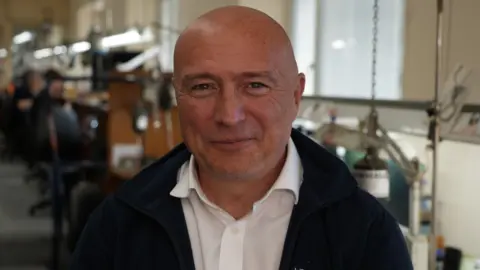 Getty Images
Getty ImagesPrime Minister Sir Keir Starmer has promised to get more people into work with reforms to overhaul job centres and more mental health funding.
Sir Keir said the government had inherited a country that “isn’t working”, and the changes would tackle the biggest drivers of unemployment and inactivity.
But many details of what the reforms will mean in practice have not been confirmed, and a review of sickness benefits will not begin until next year.
The Conservatives said the proposals showed Labour was “not prepared to take the tough but necessary choices to bring down the benefits bill”.
The government’s proposals come as it faces a major backlash from business over tax rises in announced in last month’s Budget.
Companies says the increase in National Insurance payments, together with the rise in the minimum wage, will make them less likely to create new jobs and ultimately hit the government’s goal of growing the UK economy.
But on Monday, Chancellor Rachel Reeves defended her decisions. She said despite “a lot of feedback” on her tax and spending plans, she had not heard many alternatives.
While unemployment stands at almost 1.5 million, the number of people classed as economically inactive – not employed or actively looking for work – has jumped to more than nine million. It surged during Covid, but has remained persistently high since.

Gary Wroe, managing director of Hockley Mint, a jewellery manufacturer in Birmingham, employs 98 people and take on a number of apprentices each year but Mr Wroe said the business would struggle to continue to recruit apprentices given the National Insurance rise.

One of his current apprentices, Abi, 17, said she knew of people who had left school but had not gone on to work.
“I think a lot of it does actually come down to lockdown. I think because people just kind of sat in the house and they didn’t do anything,” she added.
The government has said young people must take up offers of a job or training, or lose their benefits, and that it is going to review those rules.
Employment Minister Alison McGovern told the BBC’s Today programme that “when good help is offered, it is taken up, that is normally what happens”.
She said for the “small minority” who do not take up job offers there are already rules to take away benefits.
Benefits sanctions can kick in if a claimant does not accept an agreement to look for work, if they miss a Job Centre appointment, or if they decline a job offer.
The government has pledged to increase the employment rate to 80% from its current level of around 75%, which would mean around two million more people in work.
The prime minister said the reforms would “put an end to the culture of blaming and shaming people who for too long haven’t been getting the support they need to get back to work”.
On Tuesday, Work and Pensions Secretary Liz Kendall will announce funds to cut waiting lists at the 20 NHS trusts with the highest levels of economic inactivity, in a bid to get more people currently off sick back to work.
She will also announce plans to expand mental health support and efforts to tackle obesity.
In other measures to be unveiled:
- Every 18 to 21-year-old in England will get access to an apprenticeship, training or education opportunities or help to find a job as part of a new “Youth Guarantee” project
- Job centres will be rebranded as the National Jobs and Careers Service
- There will be an independent review of what UK employers are doing to promote health and inclusive workplaces
- The North East, South Yorkshire and West Yorkshire will get more cash to stop people falling out of work because of ill health
Getting more people into work and equipping younger people with skills, is seen as essential to the government’s goal of boosting productivity and delivering growth.
But it also does not want to be seen as a “soft touch” by some on welfare payments.
Helen Whately, shadow secretary of state for work and pensions, said the government has “dodged the difficult decisions on sickness benefits, which are needed to make the welfare system sustainable in the long term”.
Peter Cheese, chief executive of HR body the Chartered Institute for Personal Development, said the plans were “a step in the right direction” but called for “more ambition” to “make apprenticeships a viable alternative to university”.
There have been question-marks over the reliability of data on employment due to a decline in the number of people taking part in the official Labour Force Survey.
Recent analysis by the Resolution Foundation think tank suggested the survey had underestimated employment growth since 2019, and overestimated economic inactivity.


